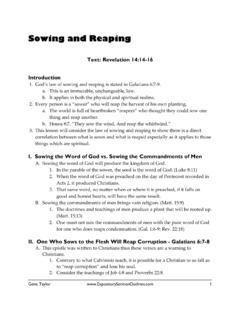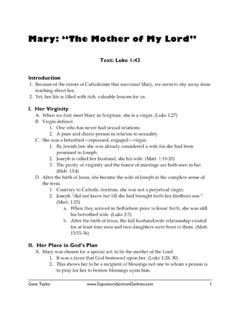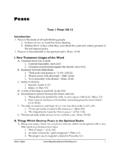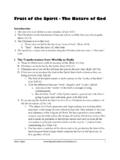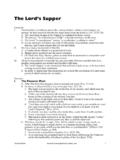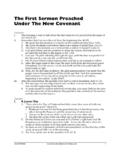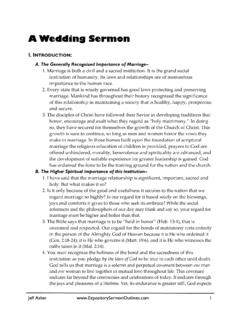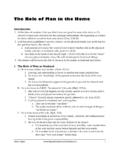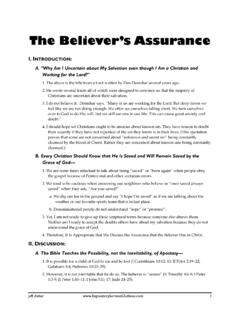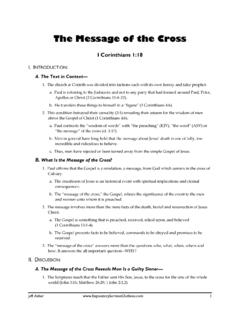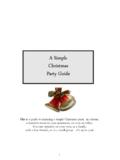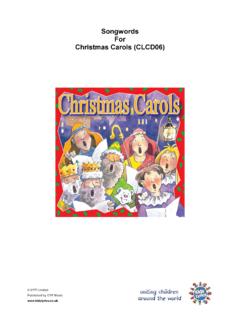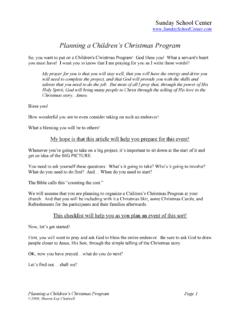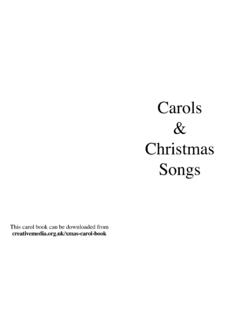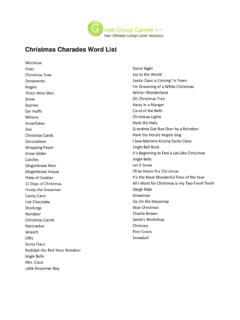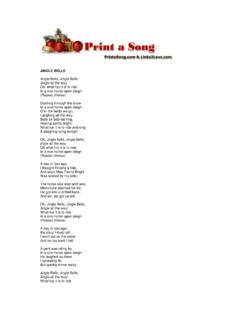Transcription of Should I Celebrate Christmas? - Free Sermon Outlines
1 David Padfield 1 Should We Celebrate christmas ? Introduction I. This lesson is controversial, but I do not apologize for that, for the Man I preach, Christ Jesus, is the most controversial Man who has ever walked the earth. A. Some things may be difficult to understand. B. Some things may even shock some people. C. Please listen to all of the lesson. II. It is only a few more days until christmas and we can see the signs which say, Put Christ back into christmas . A. People everywhere are saying that christmas is too commercialized. B. They tell us we are overlooking the real meaning of christmas . C. Some are asking, What are you going to give Christ on His birthday? D. Other churches are organizing christmas parties, plays and programs. III. Since christmas is recognized by most people in America as a religious holiday, let us find its meaning and application to our lives.
2 A. The word christmas has Christ in it, so there must be some connection with the Lord and if there is some connection with Christ, we Should be able to read of it in one of four gospels. B. However, upon careful examination, we find neither this holiday nor its observance mentioned in all of the Bible. C. The church in the first century did not Celebrate the birth of Christ. Discussion I. Where Did christmas Originate? A. To answer these questions, must go outside the New Testament. B. christmas was for the first time celebrated in Rome in 354, in Constantinople in 379, and in Antioch in 388. (Norval Geldenhuys, Commentary on the Gospel of Luke, p. 102). C. Chrysostom, in a christmas Sermon , 386, says, It is not ten years since this day was clearly known to (Unger Bible Dictionary, p.)
3 196). II. By Whose Authority Did It Originate? A. Numerous theories have been put forward through the last 2,000 years to explain Dec. 25 as christmas Day. The most likely one, however, the one most generally accepted by scholars now, is that the birth of Christ was assigned to the date of the winter solstice. This date is Dec. 21 in our calendar, but was Dec. 25 in the Julian calendar which predated our own .. The solstice, when days begin to lengthen in the northern hemisphere, was referred to by pagans as the Birthday of the Unconquered Sun. During the third century, the Emperor Aurelian proclaimed Dec. 25 as a special day dedicated to the sun-god, whose cult was very strong in Rome at that time. Even before this time, Christian writers already had begun to refer to Jesus as the Sun of Justice.
4 It seemed quite logical, therefore, that as Christianity begun to dominate the religious scene in the Roman Empire, the date of the new-born sun Should be chosen as the birthdate of Christ. Apparently, it bothers some people that the date for christmas has its roots in a pagan David Padfield 2 feast. Be that as it may, it s the best explanation we have for the choice of Dec. 25 to Celebrate the birth of Jesus. (John Dietzen, The New Question Box, pp. 28 29). 1. John Dietzen was a Roman Catholic Priest. 2. He was also a syndicated writer for the National Catholic News Service. B. Despite the beliefs about Christ that the birth stories expressed, the church did not observe a festival for the celebration of the event until the 4th century. The date was chosen to counter the pagan festivities connected with the winter solstice; since 274, under the emperor Aurelian, Rome had celebrated the feast of the Invincible Sun on December 25.
5 In the Eastern Church, January 6, a day also associated with the winter solstice, was initially preferred. In course of time, however, the West added the Eastern date as the feast of the Epiphany, and the East added the Western date of christmas . Thus, the West subsequently divided the christmas celebration between December 25 (the birth of Christ and homage of the shepherds) and January 6 (the homage of the magi). In medieval Europe, folk customs connected with the winter solstice were perpetuated together with the church celebration. The Puritans in England and in New England tried to abolish christmas , but that move was unpopular, and christmas survived and has been developed commercially since the Industrial Revolution. (Grolier Multimedia Encyclopedia, 1997).
6 C. December 25 was used by the Romans as a feast day to the sun-god, Mithra. 1. The indications are that the church in this way grasped an opportunity to turn the people away from a purely pagan observance of the winter solstice, to a day of adoration of Christ the Lord. (Colliers Encyclopedia). 2. christmas was not among the earliest festivals of the church, and before the fifth century there was no general consensus of opinion as to when it Should come in the calendar, whether January 6th, March 25th, or December 25th. (Encyclopedia Britannica, Vol. 5, p. 641). D. From these statements from reliable sources, it is easy to see the date of christmas had its origin in a pre-christian age among the pagans, and was adopted into a Christian holy day by the Roman Catholic Church.
7 E. Furthermore, the word christmas is of Catholic origin. 1. Word is derived from the medieval Christes Masse. 2. On this day the Catholic Church holds a special Mass for Christ. F. christmas originated in the Catholic Church, and is a Catholic Holy Day. III. What Does The Bible Say About This Day? A. The Bible reveals all that man needs for salvation: 1. The Scriptures make us complete (2 Tim. 3:16 17). 2. They give us all things that pertain to life and godliness (2 Peter 1:3). 3. Christians must speak as the oracles of God (1 Peter 4:11). B. If God had wanted us to observe the birth of Christ, He would have told us! C. If we honor this Catholic Day, we are bound by consistency to honor all! D. Some people say, But we need to observe the birth of Christ!
8 1. Why Should we unless it is authorized by God? 2. Did God simply forget to tell us how to observe the birth of Christ? 3. If He wants us to observe a special day for His birth, when is it? David Padfield 3 IV. When Is The Birthday Of Jesus? A. The date has been fixed at many times throughout the year. 1. We can not say for certain when it was. 2. However, we are reasonably certain it was not on December 25. B. At the birth of Christ (Luke 2:1 16) we read that, there were in the same country shepherds living out in the fields, keeping watch over their flock by night. (Luke 2:8, NKJV). 1. According to this statement, Jesus cannot have been born in December, in the middle of the rainy season as has been since the forth century supposed .. According to the Rabbins, the driving forth of the flocks took place in March, the bringing in of them in (Meyer, Critical and Exegetical Handbook To The Gospels of Mark and Luke, p.)
9 273). 2. It was a custom among the Jews to send out their sheep to the deserts, about the Passover, and bring them home at the commencement of the first rain; during the time they were out, the shepherds watched them night and day. As the Passover occurred in the spring, and the first rain began early in the month of Marchesvan, which answers to our part of October and November, we find that the sheep were kept out in the open county during the whole of the summer. And as these shepherds had not yet brought home their flocks, it is a presumptive argument that October had not yet commenced, and that, consequently, our Lord was not born on the twenty-fifth of December, when no flocks were out in the fields. (Adam Clarke s Commentary, p. 857). 3. December 25th, at the very best, is only a myth.
10 C. Another myth has to do with the three wise men, or three kings. 1. We don t know how many there were, and we are certain they were never at the manger. 2. Eastern Catholics traditionally speak of 12 kings, instead of three. 3. Magi. Originally the Magi, wise men, were a priestly tribe of soothsayers of Media who served under their Persian conquerors. The name magoi was used by Matthew (2:1 12) to indicate sages who came to adore Christ. While they are declared to come from the East, their homeland was most likely the land beyond the Jordan River and east of the Dead Sea. They probably visited Christ after the purification (Lk. 2:22 38), which took place 40 days after birth. The gifts they brought to the newborn Christ were products of their native land, Arabian in character, and were such as would be presented to a king.
